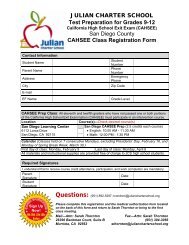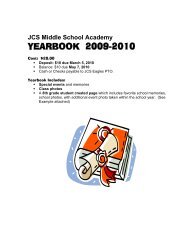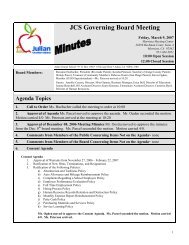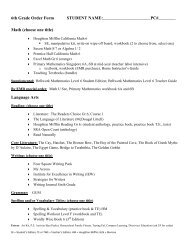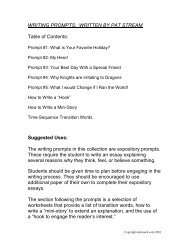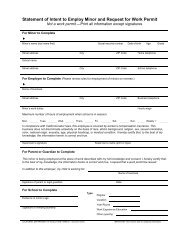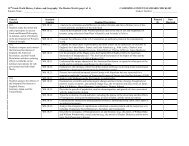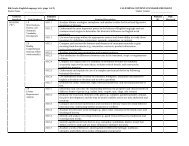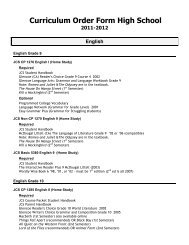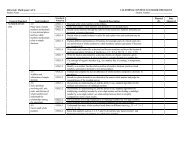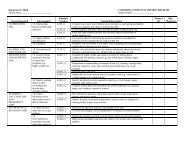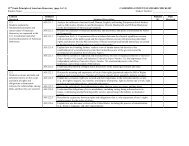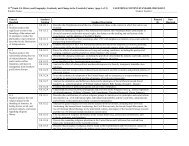2009-2010 Self-Study WASC Action Plan - Julian Charter School
2009-2010 Self-Study WASC Action Plan - Julian Charter School
2009-2010 Self-Study WASC Action Plan - Julian Charter School
You also want an ePaper? Increase the reach of your titles
YUMPU automatically turns print PDFs into web optimized ePapers that Google loves.
• Support from school counselors for academic planning;<br />
individual student meetings or individual family<br />
meetings held at a convenient location.<br />
• High school academies promote “a-g” courses.<br />
• <strong>School</strong> focuses on continuous improvement with high<br />
staff expectations, proactive program modifications,<br />
collaborative teams, new teacher support (BTSA), and<br />
administrative coaching.<br />
• Support classes, intervention strategies, service<br />
providers, and tutoring are widely available.<br />
• Teachers promote social development and awareness<br />
of a healthy, productive lifestyle, and habits that will<br />
lead to success.<br />
• Staff members show a genuine concern and high<br />
expectations for each student and demonstrate this in<br />
a myriad of ways:<br />
• Attendance at non-school related student<br />
performances.<br />
• Locating vendors/activities/services that fit with a<br />
student’s needs and goals.<br />
• Providing familial support in both academic and<br />
non-academic needs.<br />
• Helping families structure a home environment<br />
conducive to learning.<br />
• Celebrating student successes.<br />
• Seeking ways to alleviate academic distracters.<br />
• Having an arsenal of teaching strategies readily<br />
available to provide to students/families.<br />
• Helping students to schedule time, utilize<br />
organizational tools, and academic organizers.<br />
• Serving as club advisor or coach.<br />
• Building teams of families who support each other.<br />
• Mentoring of peers, parents, or students.<br />
• Teaching about and enforcing academic honesty.<br />
• Safety Net/SN tutoring<br />
• High school counselors<br />
• Counseling resources<br />
• College/career counseling<br />
• COIN3<br />
• Student dress code<br />
• Staff dress code<br />
• Strike reports<br />
• Enrichment clubs (HS/AC)<br />
• Sports programs<br />
• Prom (HS/AC)<br />
• Yearbooks<br />
Survey Responses<br />
• “Is your experience as a<br />
JCS student a positive<br />
one?” 95.8% of students<br />
responded yes.<br />
• “Are you learning the skills<br />
you need to be successful?”<br />
91.4% of students<br />
responded yes.<br />
• 97% of home study<br />
students responded that<br />
they either strongly agree<br />
or agree that they are<br />
satisfied with the relationship<br />
they have with their<br />
educational facilitator.<br />
• Student perceptions<br />
regarding their teachers<br />
indicate that the majority<br />
of students feel respected,<br />
cared for, and listened to<br />
by their teachers and are<br />
learning the skills needed<br />
to be successful.<br />
Chapter 4: <strong>Self</strong>-<strong>Study</strong> Findings: <strong>School</strong> Culture and Student Support<br />
88 <strong>Julian</strong> <strong>Charter</strong> <strong>School</strong> Focus on Learning <strong>2009</strong>-<strong>2010</strong>



